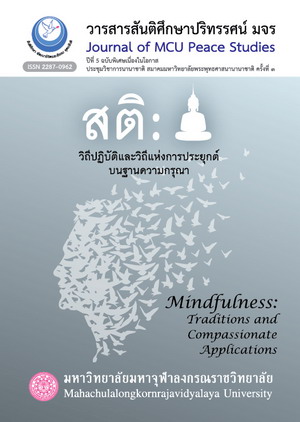An Application of Metta in Theravada Buddhism to Conflict Management
Main Article Content
บทคัดย่อ
This thesis, “An application of Metta in Theravada Buddhism to Conflict Management” is of three objectives: (1) to study the context of conflict existed in Theravada Buddhist Scripture, (2) to study the conceptual idea of Loving-kindness (Metta) in Theravada Buddhism, and (3) to apply the principle of Loving-kindness (Metta) to conflict management.
The findings are as following: Conflict is one of human natures resulting from both internal and external factors that are associated enough to force difficulty in controlling behavior. Therefore, the gathering of living together in a multicultural society causes conflict. Hence, conflict is normal, as a result, people in the society are unhappy. However, conflict does not reflect only the negative side but also resulted in changes in terms of creativity and benefits to the public; this depends on the process or how or which means to manage the conflict. The Buddha suggested Metta: Loving-kindness to the Buddhist assemblies, those are inserted in various Buddhadhammas in order that humans can apply in living their daily lives for the peace of their own and for the society by starting firstly from oneself and when one is successful, then he can spread love and good wishes to others and the society.
Therefore, the researcher is presenting the 3 following guidelines for the application of Metta to conflict management:
(1) The guidelines and the means to manage conflicts arisen to oneself are: to always consider oneself, practice the Four Satipatthana, the applications of Dhammas of tolerance and equanimity, having good intention for oneself, and the adjustment of behaviors.
(2) The guidelines and the means to manage conflicts arisen to others are: mind-opening, listening to reasons, forgiving and yielding opportunities, respecting to personal privacy of rights, being courteous, giving honor, making and keeping relationships.
(3) The guidelines and the means to manage conflicts arisen in the society are: acceptance of rules and regulations, giving respects to persons and places, agreement of meeting resolution.
Article Details
ทัศนะและความคิดเห็นที่ปรากฏในบทความในวารสาร ถือเป็นความรับผิดชอบของผู้เขียนบทความนั้น และไม่ถือเป็นทัศนะและความรับผิดชอบของกองบรรณาธิการ ยินยอมว่าบทความเป็นลิขสิทธิ์ของวารสาร


